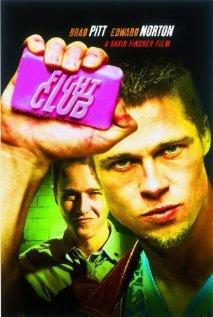
“Things that you own wind up owning you,” says Tyler Durden, provocateur, bare-fisted brawler, soap salesman. “Martha Stewart is polishing the brass on the Titanic.”
“Shocking, disturbing, possibly dangerous, visceral, hard-edged” write reviewers of this intelligent and jarring film by David Fincher (The Game, Seven, Alien 3). Fincher, in a truthful and witty screenplay, tells us that he is giving us front row seats for the theatre of mass destruction. The fight, the deep soul struggle to break free from the modern mania of consumerism and the cult of New Age sensitivity wages between Durden (Brad Pitt) and the nameless narrator (Edward Norton) who goes by “Jack” as he wanders like a tourist from one self-help and recovery group to another. “Our great war is a spiritual war, our Great Depression is our lives,” preaches Durden.
“We’re all raised by television to believe that one day, we’re all going to millionaires, movie gods and rock stars, but we won’t And we’re figuring that out now.”
“Your father was your model for God. And if your father bails out, what does that tell you about God?
“You are not your job. You are not how much you have in the bank. You are not your khakis.”
Jack works for a large auto parts company and he spends his days calculating the value of human life – how many law suits and how much loss of profit the company can sustain before recalling its defective parts. As Jack ponders the value of his own life and his own addiction to recovery, he concludes that he will be valuable to someone else only when and if he’s terminally ill. Then he meets Tyler Durden, a Kafka-esque alter ego. They fight, pound their bodies to bloody exhaustion, and discover a rejuvenating sense of life. This spiritual awakening leads them to form Fight Club. They discover that men everywhere want to join, to fight, to rage against being emasculated and isolated. But, as one reviewer observes, “these guys are beyond angry. They are heartbroken and lost.” They are searching for the souls that slowly and secretly have been stolen from them.
Fight Club is a visual spectacle. Not everyone will like the way it tells the story and describes the way men (and women) are desperate to escape the dehumanizing trap of modern materialism. Susan Faludi is a feminist who offers a thoughtful assessment of the impact of the radical feminist movement upon men. Her recent book, Stiffed, is about the need men have to regain and be restored to a healthy masculinity and male identity. Her thesis points to the tension of this film – individual human life really does have worth after all. It’s worth the struggle to tear down all the icons of our age that makes us slaves, sub-human, isolated. Ironically, Durden’s charismatic and violent liberation itself becomes a new tyranny, which Jack comes to realize as the film moves into its final act.
Edward Norton, Brad Pitt, and Helen Bonham Carter all give superior performances. The film dares to evoke images of Columbine to explore some profound reasons that drive young men to do these things. In the midst of such great technological wizardry and electronic intimacy, why are we alone, why are we angry, what weight is pressing upon us to fill us with rage, and how do we discover freedom and belonging.
The normally austere BBC reviewer writes, “Fight Club appears threatening to some because it seems to challenge the safety of the modern world. All you really need to know is that Fight Club rocks!”
-Steve Froehlich


